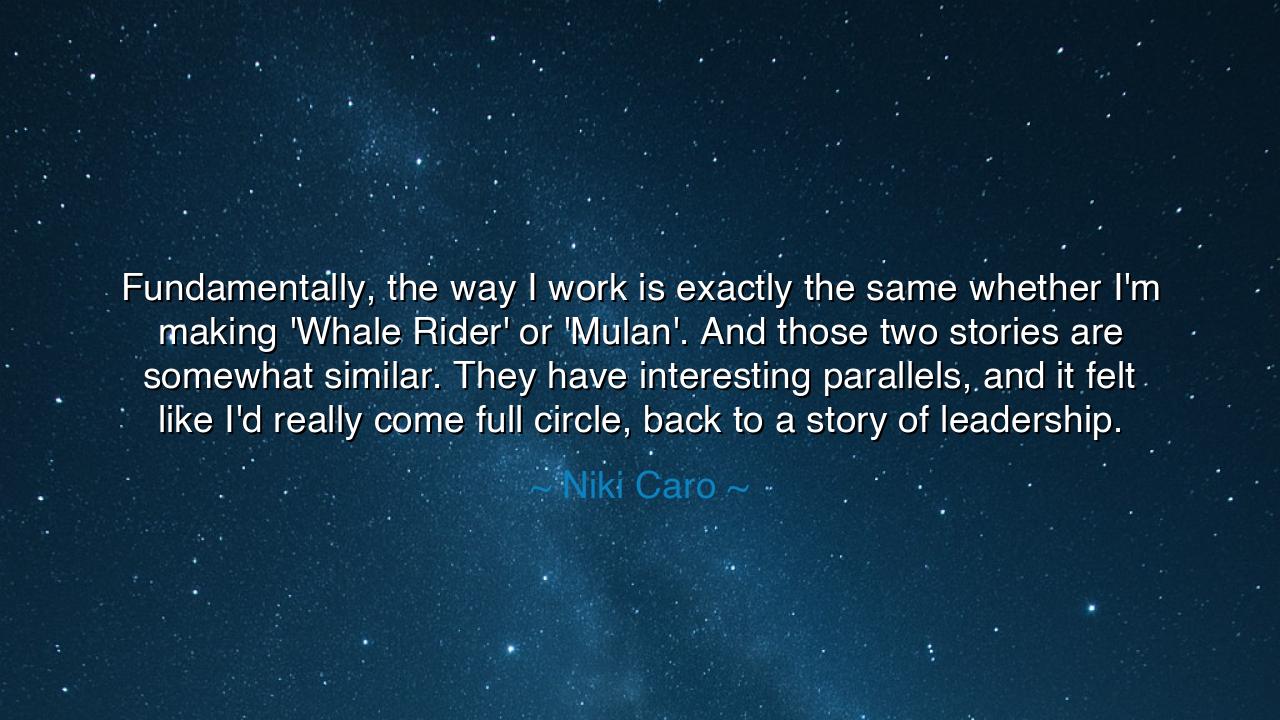
Fundamentally, the way I work is exactly the same whether I'm
Fundamentally, the way I work is exactly the same whether I'm making 'Whale Rider' or 'Mulan'. And those two stories are somewhat similar. They have interesting parallels, and it felt like I'd really come full circle, back to a story of leadership.






In the words of Niki Caro: “Fundamentally, the way I work is exactly the same whether I’m making Whale Rider or Mulan. And those two stories are somewhat similar. They have interesting parallels, and it felt like I’d really come full circle, back to a story of leadership.” These words are more than the reflection of an artist—they are the testimony of a storyteller who sees that across cultures, across centuries, the path of the hero is bound by common threads. Whether in the Polynesian tale of a young girl who rises to lead her people, or in the Chinese legend of a daughter who takes her father’s place in battle, the essence is the same: the eternal story of leadership born from courage, sacrifice, and vision.
The ancients knew this circle well. They told their myths not for entertainment alone, but to shape the hearts of their children and to prepare the minds of their people. From the Greeks came the tale of Perseus, who dared to face the Gorgon; from the Hebrews, the rise of Esther, who risked her life to save her people; from the Chinese, the story of Hua Mulan, who disguised herself as a man to defend her family’s honor. In each tale, as in Caro’s works, the figure of the unlikely hero shows us that true leadership does not spring from privilege, but from character.
In Whale Rider, the young Paikea, though dismissed because of her gender, proves through heart and persistence that she is worthy to inherit the mantle of her ancestors. In Mulan, a daughter’s love and duty lead her into the heart of war, where her courage and cunning save a nation. Caro sees in these stories not difference but parallels, the shared truth that leadership is not confined to one land or one culture, but is the universal destiny of those who rise above doubt and fear.
History itself reflects this pattern. Think of Joan of Arc, the peasant girl who claimed divine vision and led France to victories that seasoned generals could not win. Like Paikea and Mulan, she was doubted, mocked, and resisted, yet her flame of conviction lit the hearts of her people. Though her end was tragic, her spirit endured, showing that leadership is often a lonely road, yet one that reshapes the destiny of nations.
Caro’s words also reveal the unity of her own work as a storyteller. She shows us that while the costumes may change, the landscapes may differ, and the languages may shift, the fundamental rhythm of storytelling remains constant. It is always about humanity, about the eternal struggle to rise above the limits imposed by society, tradition, or fear. In this way, she returns, as she says, “full circle,” to the oldest purpose of stories: to inspire the courage of leadership in those who hear them.
The lesson for us is clear: seek the parallels in the stories around you. Do not dismiss another’s tale because it comes from a different land, tongue, or tradition. Beneath the surface, you will often find your own reflection, the same struggles, the same triumphs, the same call to rise when the world tells you to bow. Every culture preserves its heroes so that we might learn that greatness is possible within ourselves.
Therefore, O listener, take this wisdom into your heart: honor the storytellers, for they guard the path to courage. See the parallels between your journey and the journeys of those long past. And above all, remember that leadership is not granted, but discovered—born not from titles, but from the fire within. Whether in the story of Paikea, Mulan, or your own life, the circle is the same: to struggle, to rise, to lead.






AAdministratorAdministrator
Welcome, honored guests. Please leave a comment, we will respond soon